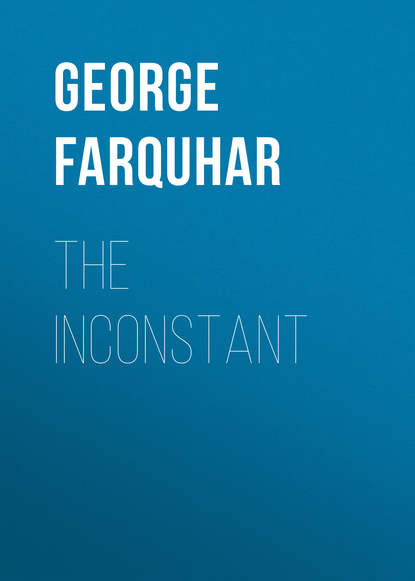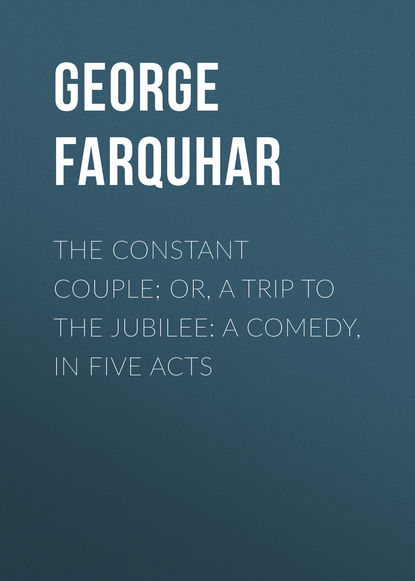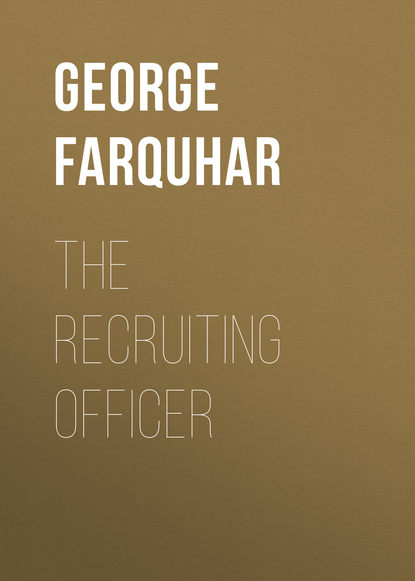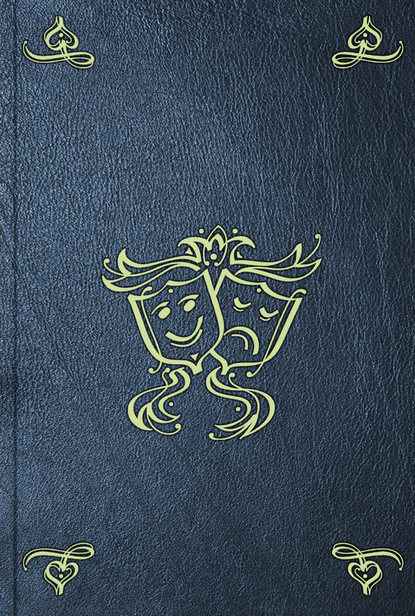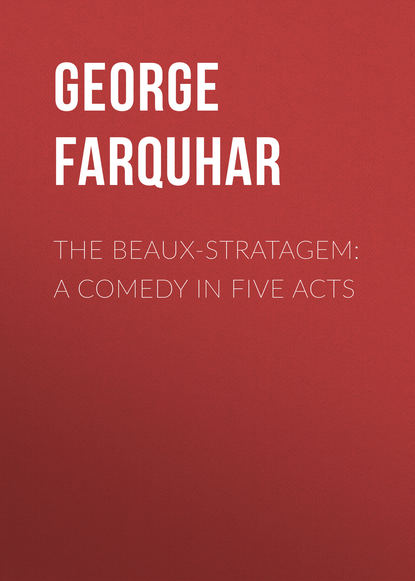
Полная версия
The Beaux-Stratagem: A comedy in five acts

George Farquhar
The Beaux-Stratagem: A comedy in five acts
REMARKS
It is an honour to the morality of the present age, that this most entertaining comedy is but seldom performed; and never, except some new pantomime, or other gaudy spectacle, be added, as an afterpiece, for the attraction of an audience.
The well drawn characters, happy incidents, and excellent dialogue, in "The Beaux Stratagem," are but poor atonement for that unrestrained contempt of principle which pervades every scene. Plays of this kind are far more mischievous than those, which preserve less appearance of delicacy. Every auditor and reader shrinks from those crimes, which are recommended in unseemly language, and from libertinism united with coarse manners; but in adorning vice with wit, and audacious rakes with the vivacity and elegance of men of fashion, youth, at least, will be decoyed into the snare of admiration.
Charmed with the spirit of Archer and Aimwell, the reader may not, perhaps, immediately perceive, that those two fine gentlemen are but arrant impostors; and that the lively, though pitiable Mrs. Sullen, is no other than a deliberate violator of her marriage vow. Highly delighted with every character, he will not, perhaps, at first observe, that all the wise and witty persons of this comedy are knaves, and all the honest people fools.
It is said, that this play was written in six weeks – it is more surprising still, that it was written by a dying man!
Farquhar was a gentleman of elegant person and bewitching address, who, having experienced the vicissitudes of life, as a man of fashion, an actor, a captain in the army, an author, a lover, and a husband; and having encountered bitter disappointment in some of his adventures – though amply gratified by others – He, at the age of twenty-nine, sunk into a dejection of spirits and decline of health; and in this state, he wrote the present drama. – It had only been acted a night or two, when the author, in the midst of those honours, which he derived from its brilliant reception – died.
As a proof that Farquhar was perfectly sensible of his dangerous state, and that he regained cheerfulness as his end approached, the following anecdote is told: —
The famed actress, Mrs. Oldfield, performed the part of Mrs. Sullen, when the comedy was first produced; and being highly interested in its success, from the esteem she bore the author; when it drew near the last rehearsal, she desired Wilkes, the actor, to go to him, and represent – that she advised him to make some alteration in the catastrophe of the piece; for that she was apprehensive, the free manner in which he had bestowed the hand of Mrs. Sullen upon Archer, without first procuring a divorce from her husband, would offend great part of the audience. "Oh," replied Farquhar, gaily, when this message was delivered to him, "tell her, I wish she was married to me instead of Sullen; for then, without the trouble of a divorce, I would give her my bond, that she should be a widow within a few days."
In this allusion he was prophetic; – and the apparent joy, with which he expected his dissolution, may be accounted for on the supposition – that the profligate characters, which he has pourtrayed in "The Beaux Stratagem," were such as he had uniformly met with in the world; – and he was rejoiced to leave them all behind.
DRAMATIS PERSONÆ

ACT THE FIRST
SCENE I
An Inn Enter Boniface, running. – Bar Bell ringsBon. Chamberlain! Maid! Cherry! Daughter Cherry! All asleep? all dead?
Enter Cherry, runningCher. Here! here! Why d'ye bawl so, father? d'ye think we have no ears?
Bon. You deserve to have none, you young minx: – The company of the Warrington coach has stood in the hall this hour, and nobody to show them to their chambers.
Cher. And let them wait, father; – there's neither red coat in the coach, nor footman behind it.
Bon. But they threaten to go to another inn to-night.
Cher. That they dare not, for fear the coachman should overturn them to-morrow – [Ringing.] Coming! coming! – Here's the London coach arrived.
Enter several People with Trunks, Bandboxes, andother Luggage, and cross the StageBon. Welcome ladies.
Cher. Very welcome, gentlemen – Chamberlain, show the lion and the rose.
[Exit with the Company. Enter Aimwell, in a Riding Habit, Archer as Footman, carrying a PortmanteauBon. This way, this way, gentlemen.
Aim. Set down the things; go to the stable, and see my horses well rubbed.
Arch. I shall, sir.[Exit.
Aim. You're my landlord, I suppose?
Bon. Yes, sir, I'm old Will Boniface, pretty well known upon this road, as the saying is.
Aim. O, Mr. Boniface, your servant.
Bon. O, sir, – what will your honour please to drink, as the saying is?
Aim. I have heard your town of Litchfield much famed for ale, I think: I'll taste that.
Bon. Sir, I have now in my cellar ten tun of the best ale in Staffordshire; 'tis smooth as oil, sweet as milk, clear as amber, and strong as brandy, and will be just fourteen years old the fifth day of next March.
Aim. You are very exact, I find, in the age of your ale.
Bon. As punctual, sir, as I am in the age of my children: I'll show you such ale – Here, tapster, broach number 1792, as the saying is: – Sir, you shall taste my Anno Domini – I have lived in Litchfield, man and boy, above eight and fifty years, and I believe have not consumed eight and fifty ounces of meat.
Aim. At a meal, you mean, if one may guess your sense by your bulk.
Bon. Not in my life, sir; I have fed purely upon ale: I have eat my ale, drank my ale, and I always sleep upon ale.
Enter Tapster, with a TankardNow, sir, you shall see: your worship's health: ha! delicious, delicious – fancy it Burgundy, only fancy it, and 'tis worth ten shillings a quart.
Aim. [Drinks.] 'Tis confounded strong.
Bon. Strong! it must be so; or how would we be strong that drink it?
Aim. And have you lived so long upon this ale, landlord?
Bon. Eight and fifty years, upon my credit, sir; but it killed my wife, poor woman, as the saying is.
Aim. How came that to pass?
Bon. I don't know how, sir; she would not let the ale take its natural course, sir: she was for qualifying it every now and then with a dram, as the saying is, and an honest gentleman, that came this way from Ireland, made her a present of a dozen bottles of Usquebaugh – but the poor woman was never well after; but, however, I was obliged to the gentleman, you know.
Aim. Why, was it the Usquebaugh that killed her?
Bon. My Lady Bountiful said so – she, good lady, did what could be done; she cured her of three tympanies, but the fourth carried her off; but she's happy, and I'm contented, as the saying is.
Aim. Who's that Lady Bountiful, you mentioned?
Bon. 'Ods my life, sir, we'll drink her health. [Drinks.] My Lady Bountiful is one of the best of women: her last husband, Sir Charles Bountiful, left her worth a thousand pounds a year; and I believe she lays out one half on't in charitable uses, for the good of her neighbours: she cures all disorders incidental to men, women and children; in short, she has cured more people in and about Litchfield within ten years, than the doctors have killed in twenty, and that's a bold word.
Aim. Has the lady been any other way useful in her generation?
Bon. Yes, sir, she has a daughter by Sir Charles, the finest woman in all our country, and the greatest fortune: she has a son too by her first husband, 'Squire Sullen, who married a fine lady from London t'other day; if you please, sir, we'll drink his health.
Aim. What sort of a man is he?
Bon. Why, sir, the man's well enough; says little, thinks less, and does – nothing at all, 'faith: but he's a man of great estate, and values nobody.
Aim. A sportsman, I suppose?
Bon. Yes, sir, he's a man of pleasure; he plays at whist, and smokes his pipe eight-and-forty hours together sometimes.
Aim. A fine sportsman truly! and married, you say?
Bon. Ay, and to a curious woman, sir – but he's a – He wants it here, sir.
[Pointing to his Forehead.Aim. He has it there, you mean.
Bon. That's none of my business; he's my landlord, and so a man, you know, would not – but I'cod he's no better than – sir, my humble service to you. [Drinks.] Though I value not a farthing what he can do to me; I pay him his rent at quarter day; I have a good running trade; I have but one daughter, and I can give her – but no matter for that.
Aim. You are very happy, Mr. Boniface; pray what other company have you in town?
Bon. A power of fine ladies; and then we have the French Officers.
Aim. O that's right, you have a good many of those gentlemen: pray how do you like their company?
Bon. So well, as the saying is, that I could wish we had as many more of them; they are full of money, and pay double for every thing they have; they know, sir, that we paid good round taxes for the taking of them, and so they are willing to reimburse us a little; one of them lodges in my house.
Enter ArcherArch. Landlord, there are some French Gentlemen below, that ask for you.
Bon. I'll wait on them – Does your master stay long in town, as the saying is? [To Archer.
Arch. I can't tell, as the saying is.
Bon. Come from London?
Arch. No!
Bon. Going to London, mayhap?
Arch. No!
Bon. An odd fellow this; [Bar Bell rings.] I beg your worship's pardon, I'll wait on you in half a minute. [Exit.
Aim. The coast's clear, I see – Now, my dear Archer, welcome to Litchfield!
Arch. I thank thee, my dear brother in iniquity.
Aim. Iniquity! pr'ythee, leave canting; you need not change your style with your dress.
Arch. Don't mistake me, Aimwell, for 'tis still my maxim, that there's no scandal like rags, nor any crimes so shameful as poverty. Men must not be poor; idleness is the root of all evil; the world's wide enough, let them bustle; fortune has taken the weak under her protection, but men of sense are left to their industry.
Aim. Upon which topic we proceed, and, I think, luckily hitherto: would not any man swear now, that I am a man of quality, and you my servant, when, if our intrinsic value were known —
Arch. Come, come, we are the men of intrinsic value, who can strike our fortunes out of ourselves, whose worth is independent of accidents in life, or revolutions in government: we have heads to get money, and hearts to spend it.
Aim. As to our hearts, I grant ye, they are as willing tits as any within twenty degrees; but I can have no great opinion of our heads, from the service they have done us hitherto, unless it be that they brought us from London hither to Litchfield, made me a lord, and you my servant.
Arch. That's more than you could expect already, but what money have we left?
Aim. But two hundred pounds.
Arch. And our horses, clothes, rings, &c. Why we have very good fortunes now for moderate people; and let me tell you, that this two hundred pounds, with the experience that we are now masters of, is a better estate than the ten thousand we have spent – Our friends indeed began to suspect that our pockets were low, but we came off with flying colours, showed no signs of want either in word or deed.
Aim. Ay, and our going to Brussels was a good pretence enough for our sudden disappearing; and, I warrant you, our friends imagine, that we are gone a volunteering.
Arch. Why 'faith if this project fails, it must e'en come to that. I am for venturing one of the hundreds, if you will, upon this knight errantry; but in the case it should fail, we'll reserve the other to carry us to some counterscarp, where we may die as we lived, in a blaze.
Aim. With all my heart, and we have lived justly, Archer; we can't say that we have spent our fortunes, but that we have enjoyed them.
Arch. Right; so much pleasure for so much money; we have had our pennyworths; and had I millions, I would go to the same market again. O London, London! well, we have had our share, and let us be thankful: past pleasures, for aught I know, are best; such we are sure of; those to come may disappoint us, but you command for the day, and so I submit: – At Nottingham, you know, I am to be master.
Aim. And at Lincoln, I again.
Arch. Then, at Norwich, I mount, which, I think, shall be our last stage; for, if we fail there, we'll embark for Holland, bid adieu to Venus, and welcome Mars.
Aim. A match —
Enter BonifaceMum.
Bon. What will your worship please to have for supper?
Aim. What have you got?
Bon. Sir, we have a delicate piece of beef in the pot, and a pig at the fire.
Aim. Good supper meat, I must confess – I can't eat beef, landlord.
Arch. And I hate pig.
Aim. Hold your prating, sirrah! do you know who you are? [Aside.
Bon. Please to bespeak something else; I have every thing in the house.
Aim. Have you any veal?
Bon. Veal, sir! we had a delicate loin of veal on Wednesday last.
Aim. Have you got any fish, or wild fowl?
Bon. As for fish, truly, sir, we are an inland town, and indifferently provided with fish, that's the truth on't; but then for wild fowl! – We have a delicate couple of rabbits.
Aim. Get me the rabbits fricasseed.
Bon. Fricasseed! Lard, sir, they'll eat much better smothered with onions.
Arch. Pshaw! Rot your onions.
Aim. Again, sirrah; – Well, landlord, what you please; but hold, I have a small charge of money, and your house is so full of strangers, that I believe it may be safer in your custody than mine; for when this fellow of mine gets drunk, he minds nothing – Here, sirrah, reach me the strong box.
Arch. Yes, sir, – this will give us reputation. [Aside. – Brings the Box.
Aim. Here, landlord, the locks are sealed down, both for your security and mine; it holds somewhat above two hundred pounds; if you doubt it, I'll count it to you after supper: But be sure you lay it where I may have it at a minute's warning: for my affairs are a little dubious at present; perhaps I may be gone in half an hour, perhaps I may be your guest till the best part of that be spent; and pray order your ostler to keep my horses ready saddled: But one thing above the rest I must beg, that you would let this fellow have none of your Anno Domini, as you call it; – for he's the most insufferable sot – Here, sirrah, light me to my chamber.
Arch. Yes, sir!
[Exit, lighted by Archer.Bon. Cherry, daughter Cherry.
Enter CherryCher. D'ye call, father?
Bon. Ay, child, you must lay by this box for the gentleman, 'tis full of money.
Cher. Money! all that money! why sure, father, the gentleman comes to be chosen parliament man. Who is he?
Bon. I don't know what to make of him; he talks of keeping his horses ready saddled, and of going, perhaps, at a minute's warning; or of staying, perhaps, till the best part of this be spent.
Cher. Ay! ten to one, father, he's a highwayman.
Bon. A highwayman! upon my life, girl, you have hit it, and this box is some new purchased booty. – Now, could we find him out, the money were ours.
Cher. He don't belong to our gang.
Bon. What horses have they?
Cher. The master rides upon a black.
Bon. A black! ten to one the man upon the black mare: and since he don't belong to our fraternity, we may betray him with a safe conscience: I don't think it lawful to harbour any rogues but my own. Lookye, child, as the saying is, we must go cunningly to work; proofs we must have; the gentleman's servant loves drink; I'll ply him that way, and ten to one he loves a wench; you must work him t'other way.
Cher. Father, would you have me give my secret for his?
Bon. Consider, child, there's two hundred pound, to boot. [Ringing without.] Coming, coming – child, mind your business.
[Exit Boniface.Cher. What a rogue is my father! My father! I deny it – My mother was a good, generous, free-hearted woman, and I can't tell how far her goodnature might have extended for the good of her children. This landlord of mine, for I think I can call him no more, would betray his guest, and debauch his daughter into the bargain, – by a footman too!
Enter ArcherArch. What footman, pray, mistress, is so happy as to be the subject of your contemplation?
Cher. Whoever he is, friend, he'll be but little the better for't.
Arch. I hope so, for, I'm sure, you did not think of me.
Cher. Suppose I had?
Arch. Why then you're but even with me; for the minute I came in, I was considering in what manner I should make love to you.
Cher. Love to me, friend!
Arch. Yes, child.
Cher. Child! manners; if you kept a little more distance, friend, it would become you much better.
Arch. Distance! good night, saucebox. [Going.
Cher. A pretty fellow; I like his pride. – Sir – pray, sir – you see, sir. [Archer returns.] I have the credit to be entrusted with your master's fortune here, which sets me a degree above his footman; I hope, sir, you an't affronted.
Arch. Let me look you full in the face, and I'll tell you whether you can affront me or no. – 'Sdeath, child, you have a pair of delicate eyes, and you don't know what to do with them.
Cher. Why, sir, don't I see every body!
Arch. Ay, but if some women had them, they would kill every body. – Pr'ythee instruct me; I would fain make love to you, but I don't know what to say.
Cher. Why, did you never make love to any body before?
Arch. Never to a person of your figure, I can assure you, madam; my addresses have been always confined to people within my own sphere, I never aspired so high before.
[Archer sings.But you look so bright,And are dress'd so tight,That a man would swear you're right,As arm was e'er laid over.Cher. Will you give me that song, sir?
Arch. Ay, my dear, take it while it is warm. [Kisses her.] Death and fire! her lips are honeycombs.
Cher. And I wish there had been a swarm of bees too, to have stung you for your impudence.
Arch. There's a swarm of Cupids, my little Venus, that has done the business much better.
Cher. This fellow is misbegotten, as well as I. [Aside.] What's your name, sir?
Arch. Name! egad, I have forgot it. [Aside.] Oh, Martin.
Cher. Where were you born?
Arch. In St. Martin's parish.
Cher. What was your father?
Arch. Of – of – St. Martin's parish.
Cher. Then, friend, goodnight.
Arch. I hope not.
Cher. You may depend upon't.
Arch. Upon what?
Cher. That you're very impudent.
Arch. That you're very handsome.
Cher. That you're a footman.
Arch. That you're an angel.
Cher. I shall be rude.
Arch. So shall I.
Cher. Let go my hand.
Arch. Give me a kiss. [Kisses her.
Boniface. [Calls without.] Cherry, Cherry!
Cher. I'm – My father calls; you plaguy devil, how durst you stop my breath so? – Offer to follow me one step, if you dare. [Exit.
Arch. A fair challenge, by this light; this is a pretty fair opening of an adventure; but we are knight-errants, and so fortune be our guide! [Exit.
ACT THE SECOND
SCENE I
A Gallery in Lady Bountiful's HouseMrs. Sullen and Dorinda meetingDor. 'Morrow, my dear sister; are you for church this morning?
Mrs. Sul. Any where to pray; for Heaven alone can help me: but I think, Dorinda, there's no form of prayer in the Liturgy against bad husbands.
Dor. But there's a form of law at Doctors' Commons; and I swear, sister Sullen, rather than see you thus continually discontented, I would advise you to apply to that: for besides the part that I bear in your vexatious broils, as being sister to the husband, and friend to the wife, your examples give me such an impression of matrimony, that I shall be apt to condemn my person to a long vacation all its life – But supposing, madam, that you brought it to a case of separation, what can you urge against your husband? my brother is, first, the most constant man alive.
Mrs. Sul. The most constant husband, I grant ye.
Dor. He never sleeps from you.
Mrs. Sul. No, he always sleeps with me.
Dor. He allows you a maintenance suitable to your quality.
Mrs. Sul. A maintenance! do you take me, madam, for an hospital child, that I must sit down and bless my benefactors, for meat, drink, and clothes? As I take it, madam, I brought your brother ten thousand pounds, out of which I might expect some pretty things, called pleasures.
Dor. You share in all the pleasures that the country affords.
Mrs. Sul. Country pleasures! racks and torments! dost think, child, that my limbs were made for leaping of ditches, and clambering over stiles; or that my parents, wisely foreseeing my future happiness in country pleasures, had early instructed me in the rural accomplishments of drinking fat ale, playing at whist, and smoaking tobacco with my husband; and stilling rosemary water, with the good old gentlewoman my mother-in-law?
Dor. I'm sorry, madam, that it is not more in our power to divert you; I could wish, indeed, that our entertainments were a little more polite, or your taste a little less refined; but pray, madam, how came the poets and philosophers, that laboured so much in hunting after pleasure, to place it at last in a country life?
Mrs. Sul. Because they wanted money, child, to find out the pleasures of the town: Did you ever hear of a poet or philosopher worth ten thousand pounds? if you can show me such a man, I'll lay you fifty pounds you'll find him somewhere within the weekly bills. Not that I disapprove rural pleasures, as the poets have painted them in their landscapes; every Phyllis has her Corydon, every murmuring stream, and every flowery mead give fresh alarms to love – Besides, you'll find, their couples were never married: – But yonder, I see my Corydon, and a sweet swain it is, Heaven knows – Come, Dorinda, don't be angry, he's my husband, and your brother, and between both, is he not a sad brute?
Dor. I have nothing to say to your part of him; you're the best judge.
Mrs. Sul. O sister, sister! if ever you marry, beware of a sullen, silent sot, one that's always musing, but never thinks – There's some diversion in a talking blockhead; and since a woman must wear chains, I would have the pleasure of hearing 'em rattle a little. – Now you shall see; but take this by the way; he came home this morning, at his usual hour of four, waked me out of a sweet dream of something else, by tumbling over the tea-table, which he broke all to pieces; after his man and he has rolled about the room like sick passengers in a storm, he comes flounce into bed, dead as a salmon into a fishmonger's basket; his feet cold as ice, his breath hot as a furnace, and his hands and his face as greasy as his flannel night-cap – Oh matrimony! matrimony! – He tosses up the clothes with a barbarous swing over his shoulders, disorders the whole economy of my bed, and my whole night's comfort is the tuneable serenade of that wakeful nightingale, his nose. – O the pleasure of counting the melancholy clock by a snoring husband! – But now, sister, you shall see how handsomely, being a well-bred man, he will beg my pardon.



